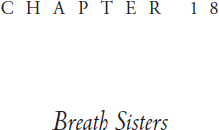Choke (14 page)
Authors: Diana López

Remembering this, I took a step forward and got in Courtney's face. “So what if Nina slobbers?”
“Yeah, so what?” Elena echoed.
“At least it's not as ugly as the trash that comes out of
your
mouth,” I said.
Courtney stepped back. She looked a little scared, but she quickly got over it. “Whatever,” she said, flashing the
W
sign, this time with the light jingle of her bracelets. “Come on, girls.” She marched off, Alicia, Liz, and the others following like obedient ducks.
“Some things never change,” Elena said.
I nodded. “I'm not going to let Courtney and Alicia get to me anymore,” I said. “They've always been mean. But Liz upsets me. She pretended to be my friend last year. She pretended to be Nina's friend, too. She played the choking game, and she went a lot further than I ever did. I can't believe she's laughing about it now. What a hypocrite.”
When I said that, Elena looked at her feet.
“What's wrong?” I asked.
“Maybe we're hypocrites, too.”
“What do you mean?”
She shrugged. “Nina's accident happened two months ago. We haven't seen her. We haven't called to see how she's doing. We didn't even send a get-well card.”
She was right. We'd spent the summer pretending like Nina didn't exist, but even though we hadn't known her very long, she had left traces of herself behind â Raindrop's collar, the lists we wrote at the mall, her drum riffs, her advice about boys, the way she stood up to bullies. These were the positive details, but Nina had her dark side, too. After all, she stole Mrs. Vargas's money and sabotaged my friendship with Elena â not to mention bringing the choking game to our school.
“I really liked Nina,” I admitted. “I thought she was cool. But I got mad at her, too. If she hadn't been hurt, if she were here today, I don't think I'd be her friend.”
Elena nodded. Then we made our way to Dillard's. We shopped in silence. There was plenty to discuss, but somehow we knew that talking about something else meant turning our backs on the topic of Nina â something our hearts no longer wanted to do.

T
he first time Elena and I called Nina's house, her mother cried.
“You don't know how much this means to us,” Mrs. DÃaz said. “Nina used to have so many friends. She used to be so popular. But no one calls her anymore. No one visits. My poor baby's all alone.”
We heard her sobbing, and we felt guilty because we'd avoided Nina, too.
“Is it okay if we come by and spend time with her?” I asked.
“Oh, please do. Nina needs to see people her own age. I know it would cheer her up.”
There was a long silence. Elena and I had questions about Nina's condition, but we didn't know how to ask. Mrs. DÃaz must have understood because she said, “Nina's not the same person anymore. She might not remember you. She ⦠she ⦔ We heard a few sniffles. “She can't do a lot of things, and when she tries, she gets frustrated. Sometimes, she gets ⦠combative.”
“We know she's changed,” Elena said.
“It's still shocking when you first see her. So I'll understand ⦠if you don't want to come after all.”
Elena and I looked at each other. This was our last chance to decide whether to accept or turn away from Nina. But we had already discussed it, and we knew what we wanted to do.
So that's how we spend our weekends now. One Saturday, we see Mrs. Vargas and Raindrop, and the next Saturday, we see Nina. Mrs. DÃaz was right. Nina is not the same person. The first time we saw her, we had to fight back tears. We think she remembers us, but sometimes we're not sure.
There are many things Nina can't do, but she can walk if she holds the wall. She can throw a ball, though she can't catch one. She can slip her legs through a pair of jeans and her arms through a shirt, and she can close a zipper if she
concentrates really hard. But forget shoelaces, buttons, and the tiny straps and buckles on her sandals. They get her fingers all tied up. Forget, too, the drums she used to play. She hits her own legs by accident or drops the sticks. Forget text messages because she can't remember her letters. Forget board games, card games, or video games. She can't understand the rules or hold the pieces.
Nina can say “no” clearly, even though her tongue gets stuck on the
n
sometimes. She can say “yes,” but only if she holds the
s
till her breath runs out. Anything longer than one syllable turns into a stream of consonants, no vowels in between. Sometimes she forgets to open her mouth when she speaks, so her words sound like noises trapped in a cocoon. I don't understand her. I hate when I don't understand her because I know she has something important to say.
I wish Nina and I still shared classes, but she doesn't go to school anymore. She rides a bus to a center. Instead of teachers, she has tutors and learning specialists. Instead of a P.E. coach, she has an occupational therapist.
Nina can laugh and blush when you tell her she's pretty. But she doesn't hold a pencil right, and when she tries to spell her name, a long squiggle ruins the page. Her mother tucks a paper towel into her collar like a bib because sometimes Nina's spoon veers to the left before reaching her
mouth. And if we try to help her, like the time I wiped some ice cream that had dribbled onto her chin, she'll push me. She'll push real hard. I'll fall back and bruise my hip against the counter. Then Mrs. DÃaz will apologize over and over again because she wants me to come back. She doesn't want Nina to lose her only friends.
I know it's weird to spend time with a person who pushes me when she's upset â who throws a book, a glass, whatever's handy when she gets mad. Who acts like she hates me sometimes. Often, Elena and I
force
ourselves to visit Nina's house. We'd rather starch and iron my dad's whole closet of clothes or pull weeds or do homework. We can think of better ways to spend our Saturday afternoons, but we go to Nina's house every other week. We don't even discuss it. We just go.
We go because one day, Elena had brought her ice-skating DVD and put it into the player. It featured highlights from the previous Olympics. We couldn't tell if Nina was watching because sometimes her eyes looked off to the sides of things. But she must have been paying attention. One skater completed a perfect triple axel. He looked so beautiful and free as he twirled in the air. When he landed, we clapped with delight, and Nina said, “Mmmaa ⦠mmma ⦔
She couldn't finish her word, and I worried that she'd
throw something because of her frustration. But then, Elena said, “That's right, Nina. That was a mag-tastic jump!”
Nina smiled because that was exactly what she'd tried to say, but also, I wanted to believe, because she knew that Elena and I understood her. Like an ice-skater, she didn't need sentences or words to tell us how she felt.
She clapped again and we joined her. Then Elena and I put our arms around Nina. We all held each other for a long time, and that's when I realized what being a breath sister truly meant.
Dear Readers,
When three of my middle school students arrived to class with bloodshot eyes, I thought they were high on marijuana, but I was wrong. They had done something that was much more disturbing. They had played the choking game, and what worried me the most was their belief that it was harmless fun.
I soon learned that the choking game was not unique to the students at my school. In fact, many young people around the country had already died or suffered brain injuries while playing this “game,” and like most people who hear sad news, I wanted to know why. Why do people play the choking game? Why do young people, especially, do
anything
that is risky or dangerous? I also wanted to know what it's like to be the person who gets hurt or the person who stands by and lets it happen.
This is what makes books so special. They allow us to live through someone else and learn through their mistakes. That way, we don't have to fall into the same traps. I hope this book is the only experience you have with the choking game and that Windy and Nina's story is enough to discourage you from taking part. But, if you are playing, please stop, and if you aren't but know someone who is, please be a good friend by reporting them.
Sincerely yours,
Diana López

DANGEROUS BEHAVIORS WEBSITE
The Dangerous Behaviors website offers statistics, testimonials,
warning signs, parental advice, medical information,
and awareness about the choking game.
CHOKING GAME AWARENESS BLOG
http://chokinggameawareness.blogspot.com
This blog/discussion board was established to raise awareness
and educate parents, children, and educators about the
dangers of the choking game.
G.A.S.P. WEBSITE
http://www.stop-the-choking-game.com/en/home.asp
The G.A.S.P. website (Games Adolescents Shouldn't Play)
provides testimonials, statistics, and a support forum for families
who have been affected by the choking game.

My deep appreciation goes to Amanda Maciel at Scholastic and Stefanie Von Borstel at Full Circle Literary. I'd also like to thank those who read drafts and gave me insightful suggestions â Connie Hsu, Irma Ned Bailey, Cindy Leal Massey, Linda Schuler, Bill Stephens, and Florence Weinberg. Thanks to Mom, Dad, Albert, Tricia, Steven, and my beautiful nephews and nieces who show so much love. Also, for much-needed moral support and for listening to my ramblings about the ups and downs of the writing life, my heartfelt gratitude goes to Vanesa Sanabria, Caryl Paulsen, Christine Granados, Kirk Woller, Rick Nichols, San Juan San Miguel, Ken Esten Cooke, and my dear friend and mentor, Dagoberto Gilb. And, always, always, thank you, Gene.

Â
Diana López
is the author of the acclaimed novel
Confetti Girl
. A former middle-school teacher, Diana currently teaches literature and creative writing at the University of Houston in Victoria, Texas. To learn more about Diana and her books, visit her online at
www.dianalopezbooks.com
.
